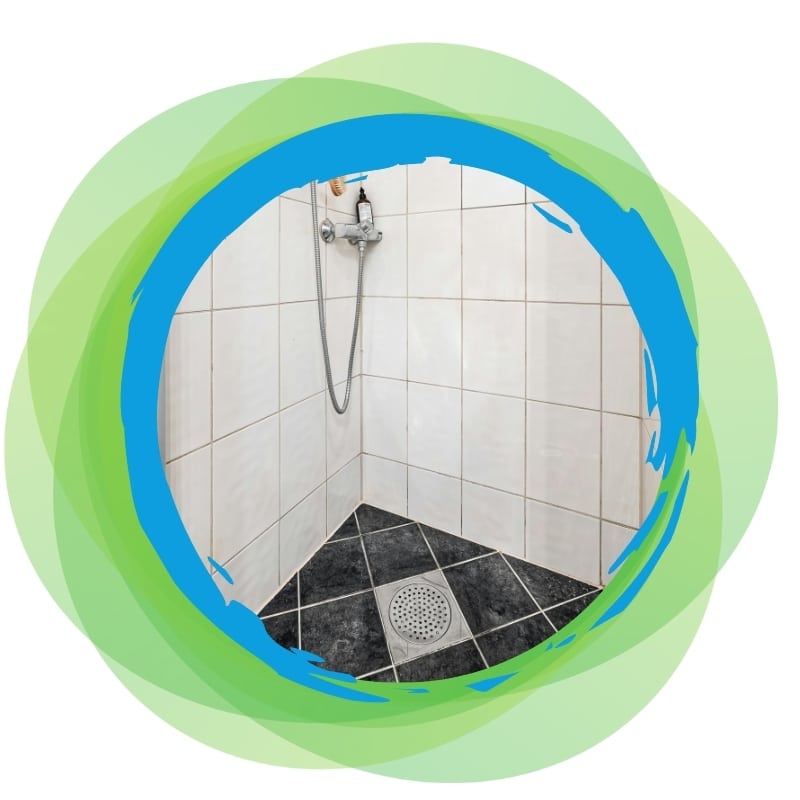A sluggish shower drain may seem like a minor hassle, but it often signals more serious plumbing issues. Ignoring it can lead to standing water, unpleasant odours, and even costly repairs. In Perth’s hard water areas, hard water deposits can exacerbate these problems, making timely action crucial. Whether it’s slow drainage or a full backup, unclogging shower drain issues promptly helps avoid long-term damage. This blog explores the causes, consequences, and solutions for a clogged shower drain, helping you maintain a smooth-flowing bathroom.
What everyday habits cause a shower drain to clog up?
Daily routines can inadvertently contribute to drain blockages. Many people don’t realise how their morning or evening shower habits can slowly sabotage their plumbing.
- Hair accumulation: Hair strands easily tangle and combine with product residue to form tight, stringy clogs.
- Soap scum: When bar soap or thick shampoos mix with hard water, they create a sticky film that clings to the walls of pipes.
- Hard water deposits: Excess calcium and magnesium in water can gradually line your pipes with crusty buildup.
- Foreign objects: Small toys, toothpaste caps, or cotton tips often get dropped and stuck unnoticed.
- Improper disposal: Washing oil, coffee grounds, or food scraps down a shower drain can cause solidified blockages.
These blockages rarely occur overnight—they build up gradually, often catching you off guard. Preventing these habits is key to avoiding a clogged shower drain.
When do minor clogs in the shower turn into bigger problems?
A slow-draining shower might seem trivial, but it can escalate quickly. What starts as a mild annoyance can soon spiral into a plumbing emergency.
- Persistent odours: Trapped debris can emit unpleasant smells.
- Water damage: Overflowing water can damage bathroom floors and walls.
- Mould growth: Standing water creates a breeding ground for mould.
- Pipe pressure: Blockages increase pressure, which can lead to pipe bursts.
- Increased repair costs: Delays can result in more extensive and expensive repairs.
- Hidden leaks: Clogs can force water into cracks or corners, causing concealed damage.
Ignoring these signs lets blockages grow, turning a small nuisance into a major plumbing headache. Addressing minor clogs promptly can prevent them from developing into significant issues that require costly repairs.
Could ignoring early signs make unclogging the shower drain harder later?
Absolutely. Early indicators, such as gurgling sounds and slower water flow, suggest that a clog is forming. Brushing them off allows residue to solidify, making it more challenging to remove. If you wait too long, the blockage can spread deeper into the plumbing. You might end up with a backup that affects more than just the shower. These scenarios are more expensive to repair and often necessitate cutting into walls or flooring.
- Gurgling sounds: Air trapped by a partial blockage signals early trouble.
- Slow drainage: Water taking longer to drain means debris is building up.
- Standing water: Pools forming around your feet hint at a worsening clog.
- Recurring issues: Clearing the same drain repeatedly means a deeper blockage.
- Water stains or damage: Moisture marks near walls or floors indicate leaks from pressure buildup.
Instead, find reliable solutions for unclogging shower drain issues at home to save yourself a major hassle. Early intervention is key. Recognising and addressing the initial signs of a clog can prevent more severe plumbing problems down the line.
Which tools make unclogging a shower drain fast and safe?
Having the right tools can make all the difference. Whether you’re dealing with hair buildup or a soapy mess, using the proper gear keeps the job simple and safe.
| Tool | Description | Best For |
| Plunger | Creates suction to dislodge clogs | Minor blockages |
| Drain snake | A flexible tool to reach deep clogs | Hair and soap scum |
| Natural drain cleaner | Breaks down organic matter safely | Regular maintenance |
| Wet/dry vacuum | Sucks out clogs and standing water | Severe blockages |
| Protective gloves | Keeps your hands clean and safe | All unclogging tasks |
- Bucket and rags: Contain any mess during cleaning.
- Drain camera: Allows a visual inspection for stubborn or hidden clogs.
- Pipe wrench: Useful for removing and checking the P-trap.
Using the right tools minimises damage and gets your water flowing again quickly. Keep these on hand so you’re not caught off guard.
When is it best to hire a professional for unclogging shower drain problems?
Sometimes, a plunger won’t cut it. Here’s when it’s best to call in the experts:
- Recurring clogs: If they keep coming back, there’s likely a bigger problem.
- Multiple affected drains: Suggests an issue in the main line.
- Foul odours: Might indicate a sewer gas leak or deep blockage.
- Water backing up: Could flood your bathroom or damage nearby rooms.
- DIY tools not working: Professional-grade gear can handle the tough stuff.
A professional plumber can inspect, clean, and even replace parts if necessary, especially if your shower drain clogs repeatedly. Recognising when to seek professional help can save time and prevent further damage, ensuring your plumbing system remains in optimal condition.
Where does most shower drain buildup usually start?
Blockages don’t just appear overnight — they form gradually in common areas like:
- Drain covers: First to trap hair and large debris.
- P-trap: The curved pipe where most soap scum settles.
- Pipe walls: Buildup along inner surfaces narrows the flow.
- Vent pipes: Poor airflow affects the draining speed.
- Main sewer line: Larger blockages travel this far and cause widespread drainage issues.
Knowing where to look is the first step in resolving a blocked drain before it worsens. Understanding the common areas where buildup occurs can aid in early detection and prevention of severe clogs.
Why does regular shower drain care make a difference?
You wouldn’t let your car run without servicing — the same goes for plumbing.
- Prevents buildup: Removes debris before it becomes a problem.
- Reduces odours: Keeps everything flowing and fresh.
- Saves money: Avoids costly emergencies or full pipe replacements.
- Improves flow: No standing water or slow draining.
- Extends pipe life: Less wear from pressure and corrosion.
- Less stress: A clean drain means no surprise puddles during your morning shower.
Routine care keeps your bathroom humming. Cleaning monthly and using drain strainers works wonders.
Final thoughts
Leaving drain clogs too long can lead to more severe plumbing issues and higher repair costs. Minor signs shouldn’t be ignored, and regular upkeep goes a long way. Explore how Eco Plumbers 24/7 can assist with drain issues if you’re unsure where to start or need tailored support.

